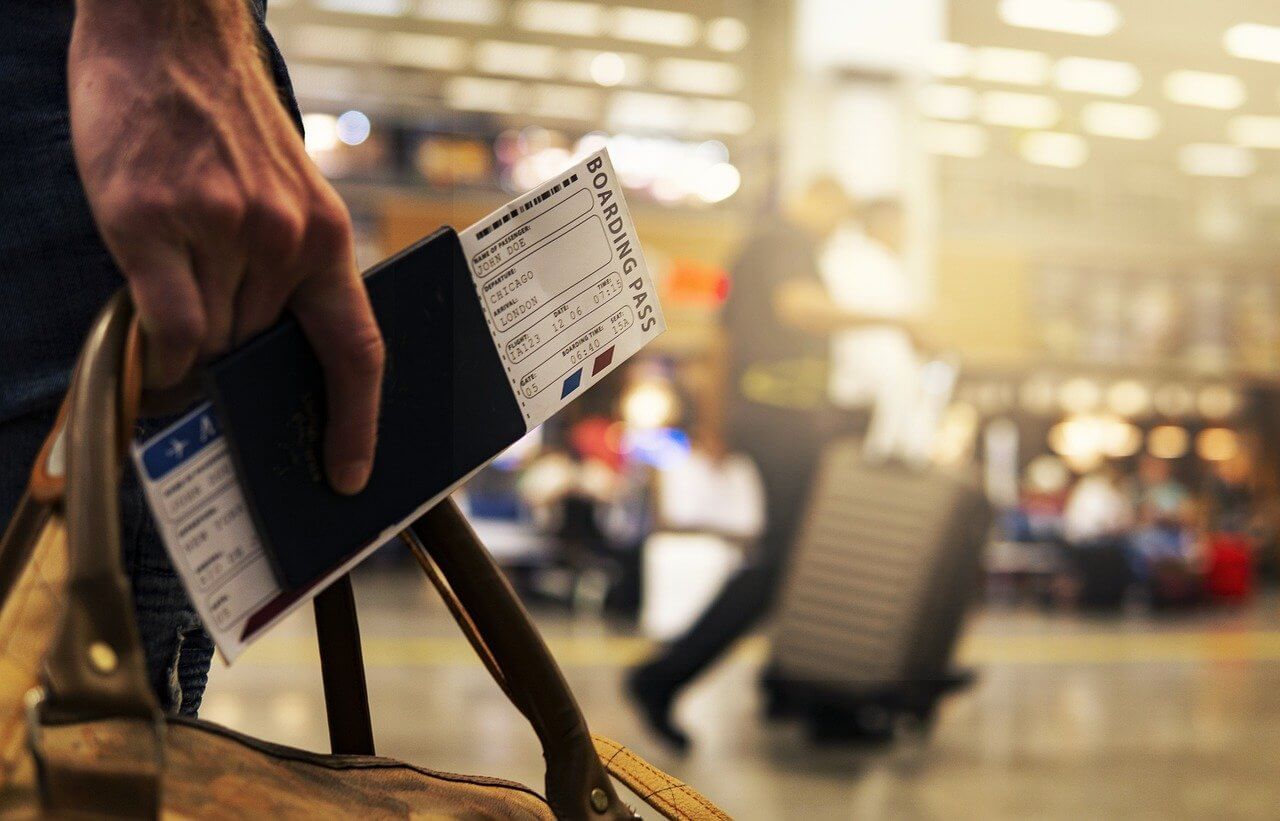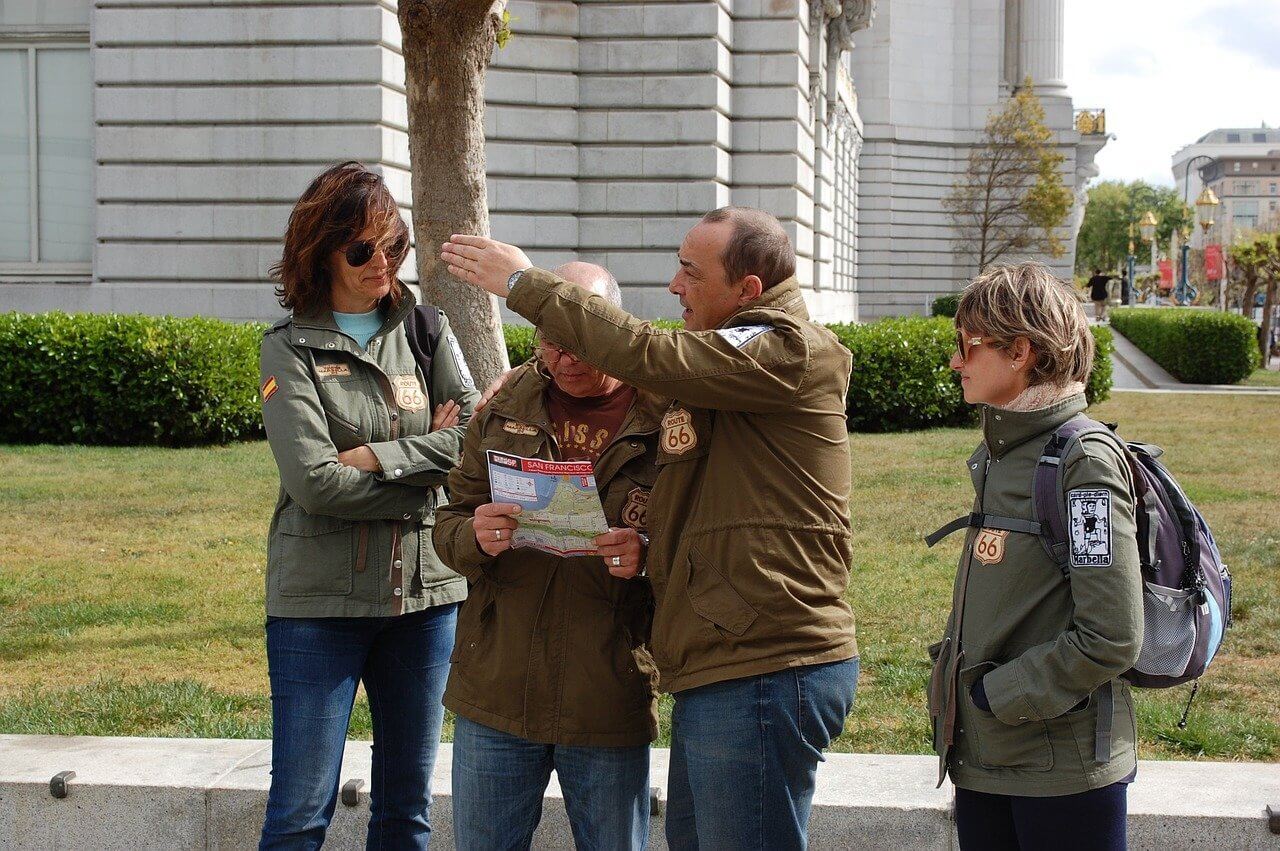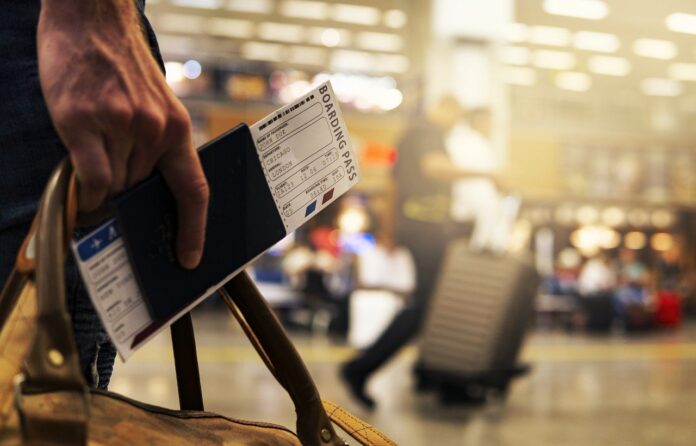Traveling means discovering new cultures, tasting varied cuisines and meeting people from all over the world. If English is the universal language par excellence, it is sometimes intimidating to use it when you have not completely mastered it. Don't panic! In this article, discover a selection of English sentences and expressions practical and easy to rememberadapted to all travel situations as well as our best advice to prepare you for your first English immersion trip.

The essential phrases in English at the airport and on a plane
At the airportmany steps require a minimum of English: registration, security, and orientation. Here are the key phrases to help you:
- Where is the check-in desk for [Airline]?
→ Where is the check-in counter for[compagnie aérienne]? - Can I see your passport, please?
→ Can I see your passport, please? - How much baggage can I carry?
→ How much baggage can I take? - Where is the departure gate?
→ Where is the boarding gate?
Once on board:
- Can I have a window seat/aisle seat, please?
→ Can I have a window/aisle seat, please? - What time will we arrive?
→ What time will we arrive? - Can I have some water, please?
→ Can I have some water, please?
Communicate with the hotel: book, check in and enjoy your stay
Exchanges in a hotel involve reservations, requests for information or problem resolution. Here are expressions to memorize:
- I have a reservation under the name [Name].
→ I have a reservation in the name of [Nom]. - Can I have a single/double room?
→ Can I have a single/double room? - What time is breakfast served?
→ What time is breakfast served? - Is there free Wi-Fi in the hotel?
→ Is there free Wi-Fi in the hotel? - I would like to extend my stay for one more night.
→ I would like to extend my stay for one more night.
If there is a problem in the room, you could say:
- The air conditioning/heating isn't working.
→ Air conditioning/heating does not work. - Can I have extra towels, please?
→ Can I have some extra towels, please?
At the restaurant: order like a pro in English
Whether you're tasting a local specialty or eating on the go, these phrases will make your life easier:
Order at the restaurant
- Can I see the menu, please?
→ Can I see the menu, please? - What's the specialty of the house?
→ What is the house specialty? - I would like [dish]please.
→ I would like [plat]Please. - Can I have a vegetarian/vegan option?
→ Do you have a vegetarian/vegan option?
At the end of the meal
- Can I have the bill, please?
→ Can I have the bill, please? - Do you accept credit cards?
→ Do you accept credit cards? - Keep the change.
→ Keep the change.
Getting around: transport and routes
Moving to a new city requires asking questions and understanding the answers. Here are some practical sentences:
On public transport
- Where can I buy a ticket?
→ Where can I buy a ticket? - Does this bus/train go to [place]?
→ Does this bus/train go to[endroit]? - How much is the fare?
→ How much does the ticket cost? - What time is the last train/bus?
→ What time is the last train/bus?
Ask for directions
- Can you show me on the map?
→ Can you show me on the map? - How far is it to [place]?
→ How far away is[endroit]? - Is it within walking distance?
→ Is it accessible on foot?
In case of emergency: ask for help
Knowing how to ask for help or explain a problem in English is essential. Here are some useful phrases:
- I need help, please.
→ I need help, please. - I'm lost. Can you help me?
→ I'm lost. Can you help me? - I need a doctor.
→ I need a doctor. - Call the police/ambulance, please.
→ Call the police/an ambulance, please. - My wallet/passport has been stolen.
→ My wallet/passport was stolen.

Meet and exchange with locals
Meeting people while traveling is one of the greatest pleasures. These phrases will help you break the ice:
- Hi, I'm [Name]. What's your name?
→ Hello, my name is [Nom]. What is your name? - Where are you from?
→ Where are you from? - Do you recommend any good places to visit?
→ Do you recommend any interesting places to visit? - It's nice to meet you.
→ Nice to meet you.
Shopping is often an essential activity when traveling. Here are a few sentences to help you:
- How much is this?
→ How much does it cost? - Do you have this in another size?
→ Do you have this in another size? - Can I pay by credit card?
→ Can I pay by credit card? - Can I get a receipt, please?
→ Can I have a receipt, please? - Is there a discount on this item?
→ Is there a discount on this item?
Why learn a few sentences in English before leaving?
English is the most widely spoken language in the world, whether as a native language or a second language. You may not be traveling to an English-speaking country, but mastering a few basics will allow you to:
- To communicate in hotels, airports and restaurants.
- To ask for help or information in an emergency.
- To interact with travelers and locals, thus creating unforgettable moments.
Knowing a few simple phrases can not only make your trip more enjoyable, but also show your willingness to adapt, which is always well received.

Learn English before leaving
If you have some time before you leave, investing in learning English can be extremely beneficial. Here are some solutions:
- Face-to-face training: Centers like Wall Street English offer courses tailored to your level, combining practical and theoretical learning.
- Online courses: Platforms like Babbel or Duolingo offer interactive exercises and short lessons to learn at your own pace.
- Videos and podcasts: Watch series or films in English with subtitles, or listen to podcasts like “The English We Speak” to enrich your vocabulary.
No matter which method you choose, the important thing is to practice regularly to be comfortable with the basics.
Express learning: a plan in 4 weeks
If you're leaving soon, follow this simple plan to master the essential basics:
- Week 1: Learn the essential phrases from this article. Focus on useful phrases for airport, transportation, accommodation and emergencies.
- Week 2: Practice pronunciation by listening to podcasts or videos. Try repeating out loud to improve your fluency.
- Week 3: Simulate conversations. Speak alone, use an online conversation tool, or find a partner to practice.
- Week 4: Review the phrases you have learned and practice improvising. Familiarize yourself with the local accent of the country you are going to travel to by, for example, listening to local podcasts.
Tips to Overcome the Fear of Speaking English
Many travelers hesitate to speak English for fear of making mistakes. Here are some tips for gaining confidence:
- Simplify your sentences: Don't try to be perfect. Use simple words and speak slowly.
- Use body language: Gestures can complement your words and make communication easier.
- Have tools on hand : A translation application like Google Translate. A notebook with a few sentences written for common situations (you can print or copy this article!).
- Show humility: Accept that you make mistakes, the locals will appreciate your effort.
- Stay polite : Always add please (please) and thank you (thank you) in your sentences. This will make your interactions much more pleasant.

Culture and uses of English around the world
English is not used the same way all over the world. Here are some examples:
- In Englandshort expressions like cheers (thank you) or fancy a cuppa? (would you like a cup of tea?) are common.
- To UNITED STATESpeople often use informal terms like awesome (great) or have a good one (Have a good day).
- In countries like India or the PhilippinesEnglish is often mixed with local languages. Be prepared to hear unique variations!
With these tips and phrases, you are ready to explore the world without language barriers! And if you're still looking for a destination, here's our list of the best destinations to travel to learn English. Have a good trip ! 🌍



